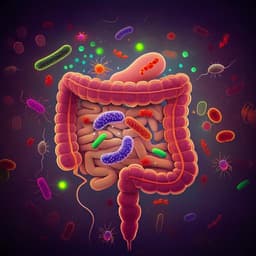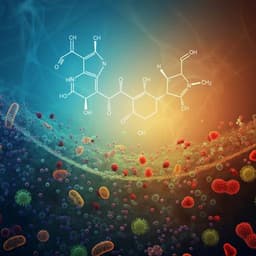
Health and Fitness
Composition of gut microbiota involved in alleviation of dexamethasone-induced muscle atrophy by whey protein
J. Qiu, Y. Cheng, et al.
Skeletal muscle is the largest organ and primary protein depot, essential for movement, respiration, feeding, energy homeostasis, nutrient metabolism, and quality of life. Muscle atrophy (loss of muscle mass and function) impairs metabolism and physical capabilities and is an independent risk factor for mortality. Glucocorticoids (GCs), including the synthetic GC dexamethasone (DEX), are widely used clinically but can rapidly induce muscle atrophy by decreasing protein synthesis and increasing protein degradation, involving pathways such as Akt/mTOR, GSK-3β, β-catenin, FOXO, REDD1, and ATF4. Although modulating IGF-I or myostatin signaling might theoretically prevent DEX-induced atrophy, translation remains challenging. Dietary strategies—exemplified by whey protein—are commonly used to mitigate atrophy, historically attributed to supplying anabolic substrates (e.g., BCAAs). However, this alone does not explain atrophy driven by DEX (non-nutrient deficiency), suggesting additional mechanisms. The gut microbiota has emerged as a key modulator of host energy, metabolism, and physiological signaling, with growing evidence for a gut-muscle axis. Prior work showed that antibiotic-induced depletion of gut microbes reduces endurance and impairs ex vivo muscle contractility; in HSCT patients, gut microbiome composition correlated with whey protein intervention efficacy. DEX has been reported to alter gut microbiota diversity. Given the high glucocorticoid receptor expression in the gut and the plasticity of microbiota to diet, the authors hypothesized that DEX alters the gut microbiota to contribute to muscle atrophy, and that whey protein could ameliorate atrophy by reshaping the microbiota. They aimed to test these ideas in a DEX-induced mouse atrophy model and to build stepwise regression models to identify microbiome-based enterotypes predictive of muscle function and weight.
The paper situates its work within the emerging concept of the gut-muscle axis. Prior studies have shown: (1) antibiotic perturbation of gut microbiota in mice impairs endurance and skeletal muscle contractile function; (2) in HSCT patients, gut microbiota composition correlates with the outcomes of whey protein supplementation for muscle atrophy; (3) DEX administration alters gut microbiota diversity and composition in mice. Mechanistic literature on DEX-induced atrophy emphasizes signaling imbalances (Akt/mTOR, FOXO, etc.), but lacks effective targeted therapies. Nutritional interventions, especially whey protein rich in BCAAs, are known to support muscle anabolism, yet such substrate-centric explanations do not fully account for DEX-induced atrophy. Additional literature highlights the metabolic roles of Bacteroidota in SCFA production, SCFA effects on host energy metabolism including skeletal muscle, and the responsiveness of microbiota to dietary interventions, motivating investigation of microbiota-mediated mechanisms and predictive enterotypes in muscle atrophy.
Experimental animals: Six-week-old male C57BL/6J SPF mice (19–22 g) were housed under SPF conditions (12-h light/dark, 18–23 °C, 45–55% RH) with ad libitum access to standard growth maintenance chow and water. All procedures were approved by the IACUC of the Institute of Food and Nutrition Development, MARA (YYSLLSC20200047). Interventions and study design: After 1 week acclimatization, mice were allocated as follows. Initial DEX effect study: DEX− group (n=10) received intraperitoneal normal saline; DEX+ group (n=10) received DEX 25 mg/kg i.p. every other day for 4 weeks. Post-modeling intervention study: An additional DEX-treated cohort (DEX+, n=30) was modeled similarly and then randomized for a further 3 weeks into: (1) continuous DEX (DD, n=10), continuing DEX injections at the same dose; (2) natural recovery (D.D., n=10), DEX discontinued; (3) whey protein after DEX discontinuation (D+W+, also denoted DW, n=10), receiving whey protein by gavage during the 3-week intervention. Whey protein (Yuanye Biotech) was prepared at 0.3 g/mL in deionized water and gavaged at 0.5 mL/mouse (0.15 g/mouse per administration). Dexamethasone (Solarbio) was dissolved in DMSO (100 mg in 2 mL) and diluted for dosing. Outcomes: Body weight and food intake were recorded weekly. Forelimb grip strength was measured (YLS-13A) by allowing mice to grasp a wire grid and gently pulling until release; six valid values were obtained and averaged. At study end, gastrocnemius and soleus muscles were dissected, cleaned, and weighed (wet weight). Fresh fecal samples were collected at endpoints for microbiome profiling. Microbiota profiling: DNA from cecal contents was extracted and 16S rRNA gene amplicons sequenced as previously described. Sequences at 97% similarity were clustered into OTUs. Alpha diversity indices (Chao1, Shannon, PD_whole_tree, Simpson) and community composition were assessed. Community structure was evaluated by principal coordinate analysis (PCoA)/principal component analysis. Relative abundances at phylum and genus levels were computed. Predictive modeling: Stepwise multiple regression was used to develop microbiome-based predictive models of muscle function (grip strength) and muscle weight (gastrocnemius). Candidate independent variables were abundances of key taxa; variables were entered/removed at F=0.05, optimizing R2 and RMSE. Models were trained and validated on independent datasets; predicted vs observed values were compared. Enterotypes were defined as compositional patterns of the feature genera contributing to the models. Statistics: Analyses used R (vegan, ggplot2), Mothur, GraphPad Prism 8, and SPSS 26. Tests included two-sided Kruskal–Wallis, Fisher’s exact test, and t-tests. Significance threshold p<0.05.
- DEX induces rapid muscle dysfunction and atrophy: Body weight and grip strength significantly decreased by week 2 in DEX-treated mice (p<0.05), with no significant change in food intake. After 7 weeks, gastrocnemius and soleus wet weights were reduced by 24.10% and 23.49%, respectively, vs controls (p<0.05).
- DEX reshapes the gut microbiota: Compared with DEX−, DEX+ mice lost 1,168 specific OTUs and gained 480 new OTUs. Alpha diversity significantly decreased (Chao1, Shannon, observed species, PD_whole_tree). PCoA showed distinct clustering between DEX+ and DEX−. At the phylum level, Bacteroidota decreased and Firmicutes increased (elevated Firmicutes/Bacteroidota ratio). At the genus level, DEX increased Lachnospiraceae_NK4A136_group, Lactobacillus, and Bifidobacterium, and decreased g_unidentified_2 and Eubacterium_ruminantium_group.
- Microbiota correlates with muscle phenotypes: Spearman correlations identified 31 genera associated with grip strength and muscle weights (r ranging from −0.881 to 0.845; p<0.05). Positive associations included Parasutterella (grip strength r=0.695) and Muribaculum (grip strength r=0.717). Parasutterella, g_unidentified_2, and Muribaculum correlated positively with both soleus and gastrocnemius weights. Negative associations included Butyricimonas, Adlercreutzia, and Bifidobacterium (e.g., Bifidobacterium with gastrocnemius weight r=−0.786; Adlercreutzia with soleus weight r=−0.721).
- Whey protein (WP) ameliorates DEX-induced deficits and restores microbiota: After discontinuing DEX for 3 weeks, both natural recovery and WP groups gained body weight back to control levels by week 8, with lower food intake than continuous DEX. Grip strength and muscle weights were higher in both discontinuation and WP groups vs continuous DEX, with WP outperforming natural recovery; grip strength in WP was not statistically different from controls. Microbiota alpha diversity recovered in both groups, and community structure shifted toward controls; WP produced a composition more similar to controls than natural recovery. Bacteroidetes/Firmicutes balance returned toward normal with DEX cessation or WP.
- Predictive enterotypes for muscle function and weight: Stepwise regression models using gut microbiota features accurately predicted grip strength and gastrocnemius weight. Grip strength model features included Clostridium_sensu_stricto_1, g_unidentified_2, Lachnoclostridium, unidentified, Ileibacterium, uncultured_rumen_bacterium, Odoribacter, Helicobacter, and Lachnospiraceae_UCG-001. Gastrocnemius weight model features included Bifidobacterium, Bilophila, Ileibacterium, Lachnospiraceae_UCG-001, Mycoplasma, and Lactococcus. Ileibacterium and Lachnospiraceae_UCG-001 contributed to both models. In exemplar DD vs DW comparisons, Helicobacter dominated both, with higher Lachnospiraceae_UCG-001 and Lachnoclostridium in DW, and higher Odoribacter in DD; for weight, Bifidobacterium dominated DD (85%) while Ileibacterium dominated DW (67%).
The study demonstrates that DEX administration not only induces skeletal muscle dysfunction and atrophy but also profoundly alters gut microbiota composition and diversity, increasing the Firmicutes/Bacteroidota ratio and reducing alpha diversity. These microbial shifts correlate with declines in muscle function and mass, implicating the gut microbiota in DEX-induced atrophy. Whey protein, beyond supplying anabolic amino acids, reshaped the microbiota toward a control-like state more effectively than natural recovery, coinciding with superior restoration of grip strength and muscle mass. These findings support a microbiota-mediated component of WP’s benefit. By integrating microbiome features into stepwise regression models, the authors identified enterotype-like compositional patterns predictive of muscle function and weight. The recurrence of taxa such as Ileibacterium and Lachnospiraceae_UCG-001 across models suggests they may be important nodes in gut–muscle cross-talk, potentially via production of short-chain fatty acids, known modulators of host energy metabolism and skeletal muscle function. Overall, the results advance the gut–muscle axis concept in the context of GC-induced atrophy and point to dietary/microbiota-targeted strategies as potential therapeutics.
DEX causes marked shifts in gut microbiota composition and diversity that associate with reduced skeletal muscle strength and mass. Discontinuation of DEX allows partial recovery, while whey protein intervention more effectively restores both muscle phenotypes and a control-like gut microbiota, including normalization of the Bacteroidetes/Firmicutes balance. Microbiome-based stepwise regression models identified enterotypes that accurately predict grip strength and gastrocnemius weight; Ileibacterium and Lachnospiraceae_UCG-001 were common predictors across models. These findings highlight the role of gut microbiota in modulating DEX-induced muscle atrophy and support the therapeutic potential of microbiota-altering dietary interventions such as whey protein. Future work should validate these enterotypes and predictive models in larger cohorts and clinical settings, and elucidate mechanistic pathways (e.g., SCFA-mediated signaling) linking specific taxa to muscle function.
The study uses a relatively small sample size and an animal model, which may limit generalizability to humans. The predictive models were developed from limited datasets and require external validation. The work is largely correlative with respect to microbiota–muscle relationships, without direct mechanistic experiments (e.g., metabolite measurements or causal microbiota transfers) to establish causation. 16S rRNA profiling provides limited taxonomic and functional resolution compared to metagenomics/metabolomics.
Related Publications
Explore these studies to deepen your understanding of the subject.







